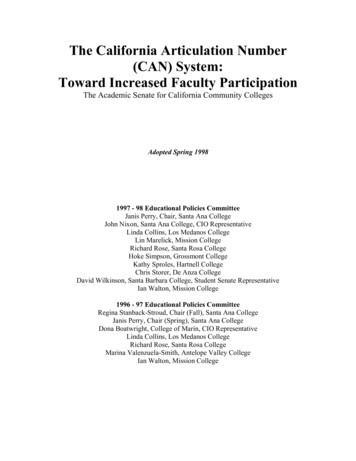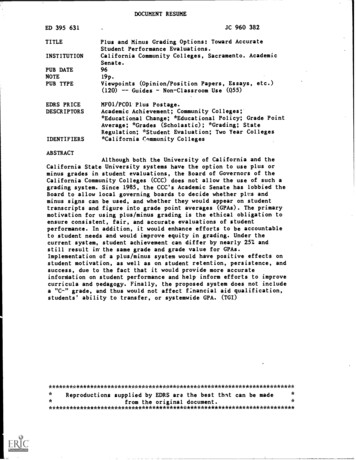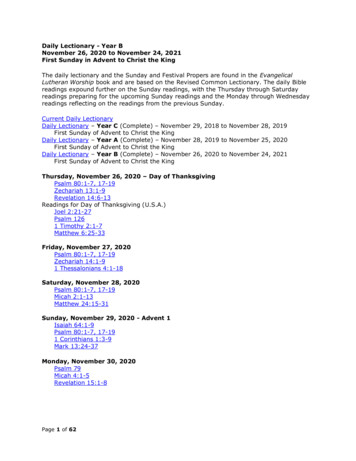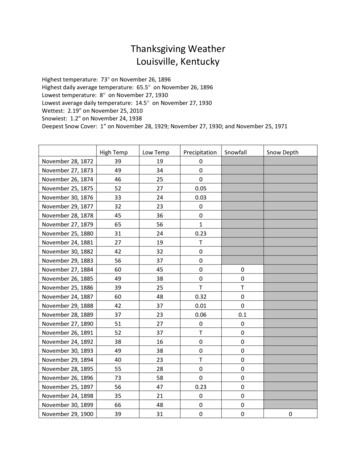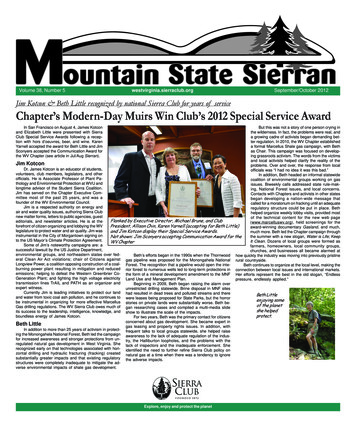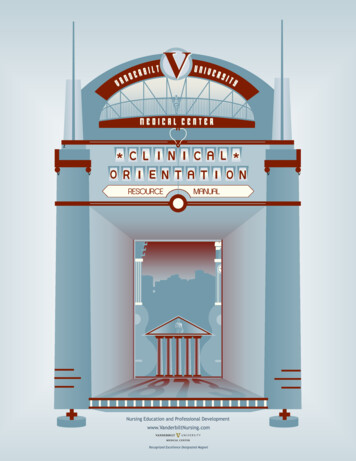
Transcription
Dr. Regina Stanback StroudNovember 16, 2011Skyline College Professor Supports the MovementDr. Tony Jackson and his wife Hilary represented his band TONE 7 at the Occupy Wall Street in Oakland onThursday morning, 10/27/11 to offer the demonstrators something light and to show their support in lieu of thepolice attack the previous Tuesday night.TONE 7 donated albums to the cause, featuring the song from the new video, "Revolutionary Eyes" in honor of theOWS (Occupy Wall Street) participants. Once at the site, Dr. Jackson and company handed out free donuts andalbums, dubbing the event, "Donuts and a Theme Song". They held interesting conversations with demonstrators,who ranged from those who had been out of work for quite some time, to students, to employed peopleparticipating by checking in on a part-time basis, to acouple of film crews from outside the U.S.Terrance Hunter said, "It’s hard out here forpeople and the banks don't care! What the cops didwas ridiculous. We're out here for them too!" Dr.Jackson noted, “Later, as we tried to throw our trashaway, we noticed that ALL the trash receptacles hadbeen moved from the area. We had to go to thestreet to find a trash receptacle and we thought itinteresting that the police were planning to use theissue of sanitation as a pre-text to re-enter the area.”Dr. Jackson (right) is shown in the photo withTerrence Hunter (left), a protester who indicates thathe has been unemployed for three years.Article and photos submitted by Dr. Tony Jackson1
SKYLINE SHINESExhibitions at Skyline College Art GalleryThere was a great turnout for the Día de los Muertos Art Exhibit and Reception at the Skyline College Art Galleryon November 2. Students created altars, sculpture, paintings and more for the exhibition, commemorating thelives of loved ones. Check out the Día de los Muertos Photo Gallery on the Skygallery Facebook page to seephotos of the reception. The Skyline College Jazz Quintet, under the guidance of new music Professor ZackBruno, performed a terrific set of beats during the reception. The Quintet featured Ben Villa on Trumpet, AndrewFenn on Tenor Sax, Nathaniel Welch on Drums, Vince Iannone on Piano, and Alex Rosales playing string Bass.All sorts of delicious Día de los Muertos pastries were provided by Casa Latina Panaderia in Berkeley. Then, onNovember 10, the college held an Art Reception for From Shadows to Light, which featured Photographs,Ceramics, and Sculptures by Skyline College students. This exhibition is guest curated by Skyline CollegePhotography Professor Arthur Takayama. The show will be on view in the Art Gallery through December 2. TheJazz Quintet also performed at the Art Reception. Visit the Skyline College Gallery website or Facebook page formore information: http://www.smccd.edu/accounts/skygallery or http://www.facebook.com/skygalleryDía de los Muertos AltarSkyline College Jazz QuintetExhibition ReceptionArticle and photos submitted by Paul Bridenbaugh2
Skyline College Students Win at National Science ConferencePhotos (from left): Sean Linder, Nicole Garza, Ronnie Marania, and Riana Mesias. The posters can beread at A group of students from Skyline College presented their research findings at the national Society for theAdvancement of Chicanos and Native Americans in Science (SACNAS) annual conference, which took placeOctober 27-29, 2011 at the San Jose Convention Center. Three Skyline College biology students took home theprize for their research.With fresh findings in biotechnology, environmental engineering, mathematics, chemistry, psychology and otherrealms, students, nearly 1,000 research posters were presented by university and college students.Skyline College student presentations: Prunus mahaleb Inhibits the Gram-negative Bacterium Escherichia coli. Estella Gomez. Mentor:Christine Case. Distribution of Fecal Coliform Bacteria In A Central California Coastal Stream. Timoty Viray and EricFung. Mentor: Christine Case. Investigation of the antimicrobial activity of Chrysanthemum indicum. Dagan Poon. Mentor: ChristineCase. The Antimicrobial Activity of Sapindus mukorossi. Raya Mesias and Anand Singh. Mentor: ChristineCase. Inhibition of Escherichia coli growth in food by Arctostaphylos glauca. Ronnie Marania and RianaMesias. Mentor: Christine Case. Antibacterial Activity of Heteromeles arbutifolia, An Ethnomedicinal Plant Historically Used By NativeAmericans. Nicole Garza and Sean Lindner. Mentor: Christine Case. Investigating the Antimicrobial Properties of Punica granatum. Jeanelle Diaz and Tsz Ying Leung.Mentor: Christine Case. Improved Motor Function in Persons With Hemiparesis Using Mirror Exercises. David Villafuerte andJeser Villaneuva. Mentor: Shari Bookstaff.Ronnia Marania and Riana Mesias won the Biology prize for their research on inhibition of E. coli bacteria in foodby a manzanita plant. Marania and Mesias are Biology majors and they are advised by Skyline College Biologyprofessor Dr. Christine Case. Rebecca Belloso, also from Skyline College, won a Biology prize for her research ona fungal infection in frogs. She was advised by Biology professor Dr. Vance Vrendenberg of San Francisco StateUniversity.The students met 2011 Nobel laureate Alex Filippenko and attended workshops on a variety of topics in scienceand professional development. Chris Case gave a presentation on “Involving Community College Students inOriginal Scientific Research.” Pat Carter, Carmen Velez, AJ Bates, and Stephen Fredricks also attended theconference.3
California State Assembly Speaker Pro Tem Fiona Ma and Skyline College’s James I.WongCalifornia State Assembly Speaker Pro Tempore Fiona Ma, Assemblywoman, 12th District, and former SanFrancisco District Supervisor, joined the Wong Family for an informal afternoon luncheon, including SkylineCollege’s James I. Wong, Professor of History andGeography. The luncheon at his mother’s apartment inSan Francisco included several hours of reminiscencesabout growing up Chinese American, as well asdiscussion about the state of affairs in San Francisco,California, China, and the United States. TheAssemblywoman also expressed to James her earnestdesire to speak on the campus of Skyline College in thefuture.Shown in photo at right: Speaker Pro Tem Fiona Ma,(in brown jacket) is next to the Wong family matriarch(in cap). Also included in the photo are the six siblingsand two in-laws of the extended Wong Family. Jamesis pictured in the white shirt next to his mother.Article submitted by James I. WongPROGRAMSTRiO Partners with Transfer Center for UC Application and Personal StatementWorkshopThe months of October and November are crucial for students transferring to a UC or CSU as admissionapplications to these institutions are being accepted. In an effort to promote transfer and to assist students withthe transfer process, the TRiO program, in collaboration with Jacqueline Escobar, Director of the Transfer Centerhosted a UC Application and Personal Statement Workshop on Tuesday, October 18, 2011.During the workshop, approximately twenty TRiO students received important updates regarding admissions to theUC system as well as step by step instructions on how to complete the application. In addition, Jacquie reviewedthe UC personal statement prompts and provided a number of strategies for writing a strong and convincingpersonal statement. Throughout the workshop, TRiO students were engaged and asked questions that helpedclarify the admissions process to the UC system. The workshop was well-received among TRiO students, whonow have a better understanding on how to apply to the UCs. Special thanks to Jacqueline Escobar for facilitatingsuch a successful workshop. Article submitted by Jessica Lopez4
Skyline Students Chosen for Leadership ConferenceA select group of Skyline College students honed leadership skills for the future during a special conference forengineering and computer science majors.The Mathematics, Engineering, Science Achievement (MESA) Student Leadership Conference offers extensiveprofessional and leadership development through direct interaction with industry mentors and speakers. The handpicked MESA students, engineering or computer science majors, are from 25 universities and community collegesacross the state, including Skyline.Pacific Gas and Electric Company (PG&E) sponsored the event with a 60,000 grant that allowed 152 students toattend. More than 18 PG&E employees volunteered their time to work closely with the students during theconference October 6-8 at the Oakland Convention Center.PG&E has supported MESA since 1979 and will be recognized for the extensive assistance in helpingeducationally disadvantaged MESA students graduate in math-based fields. Joel Dickson, director of pipelinesafety and partnerships at PG&E, encouraged students to continue on their educational paths.Other sponsors include San Diego Gas & Electric, Southern California Gas Company, East Bay Municipal UtilitiesDistrict, Sacramento Municipal Utilities District and Vanir Construction Management, Inc.Student attendees represent the following campuses: CSU Chico, CSU East Bay, CSU Fresno, CSU Long Beach,CSU Los Angeles, CSU Sacramento, San Diego State University, San Francisco State University, San Jose StateUniversity, Sonoma State University, UC Riverside, UC Santa Barbara, UC Santa Cruz, American River College(Sacramento), Butte College (Oroville), Cañada College (Redwood City), City College of San Francisco,Cosumnes River College (Sacramento), Los Medanos College (Pittsburg), Mission College (Santa Clara), NapaValley College, Sacramento City College, San Diego City College, San Joaquin Delta College, Skyline College(San Bruno), Southwestern College, and Yuba College (Marysville).For more information about MESA visit http://mesa.ucop.edu/home.html. This contribution was written by MESAStatewide Office Communications Coordinator Danielle McNamara.Pictured are Joel Dickson of PG&E on the left with Skyline College MESA Director Stephen Fredricks (Centerright) and Skyline College MESA students (left to right) Salim Hanhan & Phillip Cho (rear), Johnny Turney(Center), Elaine Talle and Rachel Pangani (Front).Photo Credit: MESA photographer Jesus Barot.5
Skyline College Backpacking Class Visits Point ReyesSkyline College students enrolled in “Backpacking for Fitness” recently completed a two-day trip to beautiful CoastCamp in Point Reyes National Seashore. The trip featured over nine miles of intense hiking with all necessaryfood and equipment carried by the students. Participants included Nathan Cunningham, Tom Chung, Xiu Li, DavidNascimento, Danny Mendoza, Hailu Asfaw, Grace Freeman, David and Nicolette Pringle, Maryann Valco, Sharonand Dwayne Akers, Dan Cappeletti, Instructor Jan Fosberg, and ECE Professor Kate Browne. Article submittedby Jan Fosberg. Photos by Kate Browne.Students Inducted Into Phi Theta KappaOn November 1, 55 Skyline College students were inducted into the Phi Theta Kappa honor society. Beta ThetaOmicron, Skyline College’s chapter, hosted the Fall induction for new members of Beta Theta Omicron, Beta XiEta (CSM) and Beta Zeta Nu (Cañada College). Our Chapter president, Camille Espirtu, welcomed new membersand their families. Camille invited new members to participate in Beta Theta Omicron’s Honors In Action project—teaching computer literacy for older adults. Professor Paul Spakowski expertly called each inductee to the stage.Stanford Education Professor, Dr. Deborah Stipek, gave the keynote address. Dr. Stipek introduced the 2012honors study topic, The Culture of Competition. Drawing on 35 years of research on academic motivation, shesays pressure to succeed at the precollege level can lead to debilitating anxiety, cheating, and take the joy out oflearning, as well as exacerbate achievement gaps between have- and have-not students. Article and photosubmitted by Dr. Christine Case6
ECE Career Pathways to Your FutureOn October 20, 70 participants from Early Childhood Education heard from a panel of professionals about Careersand College pathways. Using Early Childhood Education as a foundation, students can plan a range of careersworking with and in support of children and families.The group was welcomed by Business Dean Don Carlson, and Skyline College student data was presented byCounty Office of Education/EQuIP Director and SMCCD alumna Jeanie McLoughlin. Several panelists fromSkyline College told their stories of inspiration: Professor Steve Aurilio from Juvenile Justice, Liz Llamas ofCounseling and Family Therapy, and Elaine Francisco of Special Education described their work and how itconnects to ECE. Dr. Rene Dahl of San Francisco State described the Bachelor program in Child and AdolescentDevelopment (CAD), and alumni Jennifer In and Teresa Campbell described their experiences as CAD students.Skyline College Transfer Director Jacquie Escobar outlined transfer requirements, and the requirements andservices here at Skyline were noted by ECE Program Services Coordinators Cece Rebele and Sue Eftekhari[Canada College], Chair Kate Williams Browne, and Child Development Center Director Tina Watts.thStay tuned for the next ECE event, Saturday 4 of February. Entitled “Orientation to the ECE Field,” this morningsession is for those interested in the Teaching Profession in early care and education. Article and photossubmitted by Kate Williams Browne, Chair/Program Coordinator, ECE Department.7
Transfer Articulation Bridge ProgramThe Transfer Center in conjunction with the TRiO program have partnered with San Francisco State University’sCollege of Education to offer the Transfer Articulation Bridge (TAB) program to Skyline College students beginningspring 2012.TAB is a joint program between Skyline College and San Francisco StateUniversity designed to prepare first-generation, low income, andunderrepresented students transfer to SFSU. The TAB program providesstudents with the opportunity to concurrently enroll at SFSU while still takingcourses at Skyline College; therefore, allowing them to earn units towards theirBachelors Degree.Students participating in the TAB program will enroll in ISED 201- Introductionto SFSU, a course that serves as a bridge for students planning to transferfrom Skyline College to SFSU. Through this course, students will have theopportunity to connect with SFSU faculty, learn about student support servicesand programs, understand how the transfer process works, and feel moreconfident about transferring!Faculty Engaging Students in the Learning CenterAs the semester progresses, the Learning Center has been an instructional support hub for faculty, staff, andstudents with the purpose of facilitating student success at Skyline College. This semester, The Learning Centerhas been a popular location for faculty to host their office hour, meet with students, and be an accessible resourceon campus. Three faculty members in particular have consistently been meeting with groups of students from theircourses in The Learning Center, including Luciana Castro (Language Arts Division), Vanson Nguyen (Math,Science Technology Division), and David Hasson (Math, Science, Technology Division).In speaking with Luciana, Vanson, and David about their unique use of the Center to encourage and promotestudent learning, they had the following to say:Luciana Castro:I think the students feel a bit more intimate and ready to go in The Learning Center. My students are therefor vocabulary enhancement and conversation, what we do not have time to go over in class. I amenjoying the experience quite a bit and I feel they are too. Their performance in class has been betterthan other students who do not come to The Learning Center. It is a treat to be able to do this now!8
Vanson Nguyen:For many students, academic resources have not been accessible to them. There are several reasonswhy students haven't used them: they didn't know about them or couldn't afford them. When these samestudents get to Skyline College, it's hard for them to grasp the idea of free resources that help themsucceed. They've never used them before, so why should they use them now?The Learning Center is a great resource for students. Tutoring and computers are easily accessible forstudents and the services are FREE! I want my students to use the many resources on campus and thatstarts with The Learning Center. Whether or not my students have used resources before, it's important toknow that there's always help. As a result, I hold my office hours in The Learning Center and havestudents sit at the tables, working together.By utilizing The Learning Center, I have seen students' learning improve and, as a result, their gradesincrease. With the extra opportunities to understand the material, I see first-hand the newfound confidencemy students gain. It's not just the tutoring that helps; when they work with other classmates, the learningprocess becomes a fun. My goal is to get students to incorporate working in The Learning Center as partof their daily lives by creating a socially rewarding environment. I believe the more time these studentsspend on campus and accessing resources, the more their perception of themselves in college positivelychanges.David Hasson:Each and every time I perform an On Course assessment of my developmental math students, I find thatthe majority of them have accepted personal responsibility and discovered self-motivation. But when itcomes to employing interdependence and adopting lifelong learning, they are more often than not severelylacking. Their education up till then has essentially taught them to stick to themselves, do the work, andget out of the classroom as quickly as possible. This is where working in study groups at The LearningCenter becomes necessary.As opposed to a computer lab or other areas where silence and isolation are required, everyone is talkingto teach other in The Learning Center, whether working with a computer or a textbook, on an essay or amath problem. The Learning Center isn't just about getting my students a quick fix with their homework. It'sabout giving them a new home to connect across subjects and with each other. It's about showing themwhat interdependence and lifelong learning are all about.A special thank you goes out to Luciana, Vanson, and David for their reflections and everyone else forsupporting The Learning Center as an academic resource for students on campus. For more informationon The Learning Center, please contact Nohel Corral, Learning Center and TRiO Director, at 650-7384161 or visit us in Building 5, room 5100.Article and photos submitted by Nohel Corral.9
Transfer Day - A Huge Success!On Monday, October 24, 2011 the Skyline College Transfer Center hosted Transfer Day - with huge success!Thirty colleges were represented at the event, making this the biggest Transfer Day the college has hosted!Hundreds of students met with representatives from the California State University (CSU), University of California(UC), Private Colleges & Universities, and Out-of-State Colleges to discuss their transfer options, get updatedadmissions information, discussion program impactions, and more! Here is what the representatives had to sayabout the event: “The best of any fair yet!”; “Keep up the great event planning! Very well done!”; “Excellent! With10
budget cuts limiting college representative travel, we were fortunate to have so many representatives interested invisiting our college.This year, Skyline College’s event was co-sponsored by DeVry University who generously provided adelicious lunch for the college representatives.Thank you to all the people who helped make this event such a huge success: A special thank you to Devry University, for co-sponsoring the event Transfer Center staff and students - Dina Valedelomar, Transfer Center Career Resources CounselingAide, Jacquie Escobar, Transfer Center Director; Nadia Tariq, Career Resources Counseling Aide;Counselors Suzanne Collins and Lou Ferguson; Student Assistants Rae De la Rosa, Yee Chan, and SabaNazir; and students James and Alex. Skyline College faculty and staff - Thank you to the Skyline College community for encouraging yourstudents to attend Transfer Day, for bringing your classes to the event, for giving extra credit to studentswho attended the event.List of participating colleges:CSUsEast BayHumboldtCSU Monterey BayCSU NorthridgeSan Francisco StateSan Jose StateUCsUC BerkeleyUC DavisUC MeUC San DiegoUC Santa CruzPrivate CollegeUniversitiesAcademy of Art UniversityArt InstituteCalif. Integral StudiesDeVryFIDMGolden Gate UniversityHoly Names UniversityMenlo CollegeNational UniversityNDNUPalo Alto UniversityStanford UniversityUSFWilliam Jessup UniversityOut-of-State Colleges &UniversitiesArizona State UniversityBinghamton UniversityOklahoma City UniversityUniversity of BritishColumbiaUniversity of Nevada RenoArticle submitted by Katharine HarerPass it on to Students - Plan Ahead – Pay AheadEffective with registration for spring 2012, the Districtwill be implementing board policy that requires studentsto pay all fees at the time of registration. Students whodo not pay their fees by January 4, 2012 will bedropped from their classes.In order to make sure that students are able to pay theirfees and not be dropped from their classes, they havethe opportunity to sign up for an inexpensive paymentplan which will allow them to stretch out their paymentsbetween their registration date and April 5, 2012.Students can sign up for the payment plan by logginginto WebSMART at https://websmart.smccd.edu/Detailed information about the new policy and payment plan is located on the Skyline College website at thefollowing link: lanAhead.htmlOriginal article submitted by Christianne Marra.11
Navigating Skyline College with Visual ImpairmentsThe College Governance Council held discussions on the concerns about challenges present in the college forvisually impaired students. Disabled Students Programs and Services (DSP&S) faculty and staff met with studentswho shared different views from their perspective. Students with visual impairment have varying levels of visualability. Some have no sight while others may be able to see varying levels of light.Keep in mind that some one of the tools a visually impaired student might be would be trailing the wall or knowinglandmarks. When items are moved or placed in the halls, the changes can be challenging for a visually impairedstudent. Some students who have no sight and cannot see shadows found the Learning Center, cafeteria andhallways to be challenging and reported that their try to avoid those areas. Students who can see shadows foundit not as challenging, but also avoided many of these same areas. Here are a few of the issues the studentsidentified for the colleges consideration.Learning Center - One student reported that “the Learning Center is like a “land mine” because the chairs are allover the place. They can’t navigate the outer walls and people could get hurt with the chairs.Students reported wanting a means to independently log into the system. Currently a person helps them but if theperson is not there, they cannot help themselves.Cafeteria - The students that DSP&S spoke with with tend to go around the cafeteria and not through it becausethe tables and chairs are always being moved. People tend to set up tables in the cafeteria along the walls and wehave run into them or accidentally knocked the items off the table.Hallways The hallways should have signs reminding faculty to either open their doors completely or close themcompletely. A partially open office door is a potential hazard for visually impaired students whose canes mayindicate no obstruction but the edge of the door actually is there. Students with vision impairments reportedwalking into the edge of doors that have been left partially open. Some students tend to sit on the floors in thehallways. The college should ensure there is seating in the halls to avoid floor seating which creates an obstacleand trip hazard and to please avoid leaving random chairs in the hall.Faculty and staff are asked to please notify DSP&S if they will be moving items around on the campus. Manyitems are used as landmarks for independent mobility and navigation on campus.One student with vision impairments reported that “Course Compass/Math Lab does not work with any of theassistive technology. When we take a test or use this program DSPS has to read, mark and help submit theanswers.”Students report that “Security [public safety] has been great coming to help us when we get stuck on campus.”Visually impaired students asked that the college be more considerate when setting up a design for a room ormoving items on campus because we use various items as landmarks and without them we can feel disoriented.Input from DSP&S based on experience in working with our students with vision impairments.Another option that would be really helpful is to have faculty educate their classes about the need to move out ofthe way in hallways if they see a student walking with a sighted cane.Course Compass/MathLab is becoming a College-wide problem especially for many DSPS students who use textto-speech programs such as Kurzweil 3000, screen readers (i.e., JAWS) or screen magnifiers (ZoomText) as anaccommodation for their disabilities. The publisher, Pearson, has been made aware on several occasions thattheir product is not accessible to Assistive Technology but has not made any changes. However, it is up toinstructors to work with DSPS staff in order to provide students with disabilities with equal access to the materialsin a timely fashion that is compatible with their Assistive Technology.Having classes over in Pacific Heights is difficult for students with vision impairments. Crossing the road can bevery dangerous as drivers don’t realize that the students can’t see them.Students have arranged with public safety to have a member of the Security team escort him/her to and fromclasses. Another student arranged with the Professor to help with safe navigation to and from classes at Pacific12
Heights. One option, if possible, is to relocate classes that students with vision impairments take so that these areon the main campus rather than in Pacific Heights, thereby avoiding the need for daily assistance with safe roadcrossings. Information provided by Linda Allen.Nutrition Brochures Highlight Health BenefitsIn January, Skyline College partnered with Second Harvest Food Bank to launch a food assistance program,inaugurating the first-ever, on-campus food pantry. The Food Pantry is open to students and community memberswho qualify for the assistance.Claire Muller-Moseley, Professor of Nutrition at Skyline College, along with all Skyline College nutrition classesrecently visited the SparkPoint Food Pantry. The Nutrition 310 students learned the benefits and advantages of theFood Pantry Program. In cooperation with SparkPoint, the nutrition students applied their knowledge andexperience in designing, creating and presenting nutrition related brochures. The aesthetically visual andinformative pamphlets address the nutritional health benefits of the available Food Pantry resources and how toutilize them. Thematic topics include the value of family mealtimes, food storage and safety, food allergies, andchildren’s healthy snack foods amongst a host of other topics.In the next several months, the nutrition students with their instructor will work collaboratively to help finalize thebrochures. In addition, student bulletin boards will have varying nutrition related topics discussing portion sizes, thedifferences between fast food restaurants and home-cooked meals, the nutritional value of specific foods, et al. fordisplay in the food pantry area.Pictured (left to right): Dennis Mitchell, Student Assistant for SparkPoint at Skyline College, with Skyline Collegenutrition student Rochelle Beverage. At right are Dennis, Rochelle and nutrition student Justine Morrison.Article and photo submitted by Don CarlsonRESEARCH AND PLANNINGTransfer: Culture of InquiryCurrently, the Gates Foundation has engaged selected colleges across the nation to consider how they cansignificantly increase the numbers of students that complete degrees and certificates. This initiative – Completionby Design includes the process for considering how students are connected with, enter, progress through and exitthe colleges. By completing a pathways analysis, colleges are able to think through what the barriers are at eachpoint in the path. Additionally, they are able to consider some of the strategies for overcoming those barriers.While Skyline College is not one of the CBD colleges, we can borrow from them and apply what they are thinkingand learning to our setting in the interest of increasing the number of student who complete, graduate andtransfer.13
Over the last couple of months, I discuss items that might be connected to the Progress and Completion points inthe pathway by addressing parts of the balanced scorecard that focus on measuring certain academic outcomesfor students. Specifically, I presented data on Skyline College’s retention rate (84 percent), term persistence rate(60 percent), all course success rate (69 percent), basic skills course success rate (62 percent), ARCCachievement rate (54 percent), and transfer rate (46 percent). Additionally, data was disaggregated byrace/ethnicity to show differences in all course success rates, basic skills course success rates, and transfer rates.With each article, I also posed questions to help facilitate reflection and promote collaboration. And while thesemeasures from the balanced scorecard have provided context to some rich institutional discussion and work, theirfocus is on specific outcomes for part of the academic pathway—pro
Cosumnes River College (Sacramento), Los Medanos College (Pittsburg), Mission College (Santa Clara), Napa . Counseling and Family Therapy, and Elaine Francisco of Special Education described their work and how it connects to ECE. Dr. Rene Dahl of San Francisco State described the Bachelor program in Child and Adolescent

